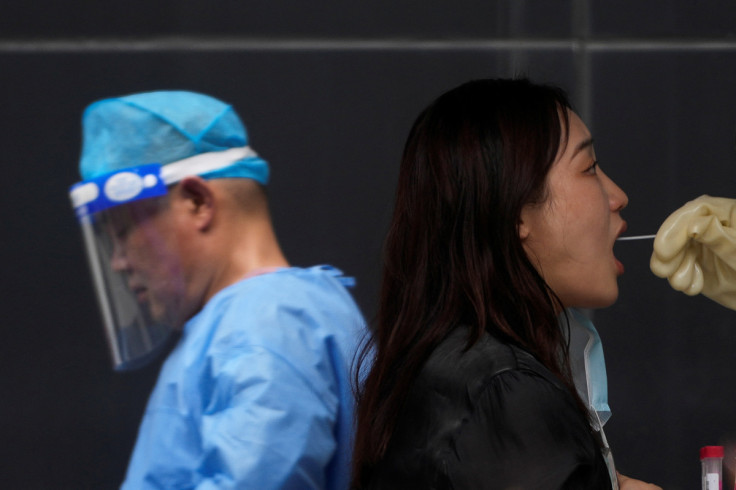Unnerved Shanghai Residents Brave Stifling Heat For Mass COVID Tests

Shanghai residents queued up in sweltering heat for compulsory mass testing for COVID-19 on Tuesday, as persistent small outbreaks fuelled anxiety in a city that is still recovering from the painful two-month lockdown lifted a few weeks ago.
The nagging daily case tolls in the commercial hub of 25 million and other outbreaks scattered across China have also unnerved global financial markets in recent days, with investors wary of disruptive COVID restrictions.
China's "dynamic zero-COVID" policy aims to eradicate all outbreaks promptly, against a global trend of co-existing with the virus. The world's No.2 economy already suffered severe damage from sweeping COVID restrictions in the second quarter, affecting global supply chains and international trade.
Shanghai authorities have repeatedly dismissed talk of broader curbs, relying on targeted lockdowns and relentless testing to contain outbreaks, which have included infections with the highly-transmissible Omicron BA.5.2.1 subvariant.
But online chat groups used by residents to organise group purchases of basic necessities during the April-May lockdown have livened up again, with people swapping advice over what items were selling out in supermarkets.
"A building nearby was sealed up and I'm thinking of stocking up on some food," said Shanghai resident Wang Jie. "Once my boss allows work from home, I will pack up my luggage overnight and leave Shanghai."
The prolonged isolation has left many mental scars on Shanghai residents, who lost income and struggled with access to basic goods. At times, the frustration led to rare bursts of public anger, with residents banging pots and pans out of their windows in protest.
"When they said last time that we would only be locked down for four days that didn't happen," said another Shanghai resident, declining to give their name. "When they come out and deny rumours we don't believe them now."
More than 200 buildings have been placed under lockdown across Shanghai, which reported 59 new cases for July 11, down from 69 the day before. All but three cases were already under isolation orders.
Residents in some compounds which are not on the official list of targeted lockdowns say they have also been told not to leave their homes for at least two days because close contacts of an infected person lived in those buildings.
The latest testing campaign involves more than half of the city's 16 districts and will take place from Tuesday to Wednesday, with residents asked to test twice over the period.
The inconvenience for those getting their nostrils swabbed on Tuesday was compounded by temperatures of around 40 degrees Celsius (102F) as parts of China were hit by a heatwave.
The increased demand for goods is causing delays of several hours on online supermarket deliveries, residents in different areas of Shanghai said.
'RISK OF FALLING GROWTH'
Overall, mainland China reported 347 new domestically-transmitted COVID infections on July 11, versus 352 the previous day - numbers that other countries would largely ignore.
Nomura analysts estimate 31 cities were implementing various COVID restrictions as of Monday, up from 11 a week earlier, highlighting "the risk of falling growth."
Second-quarter gross domestic product data on Friday and other economic indicators this week are likely to show a sharp economic slowdown from last year. Chinese shares weakened further on Tuesday.
The central province of Henan, where two towns with a combined population of roughly 1 million are under lockdown, reported 73 local infections for July 11.
In the southern province of Guangdong, which reported 42 local cases, the city of Zhuhai said on Tuesday schools must suspend in-person classes, after one kindergarten teacher was confirmed with COVID.
Infections have also been detected in the eastern provinces of Anhui, Jiangxi, and elsewhere in China.
Copyright Thomson Reuters. All rights reserved.





















